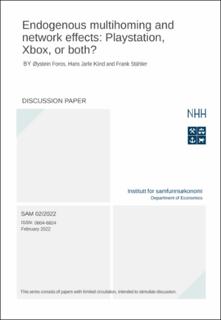| dc.contributor.author | Foros, Øystein | |
| dc.contributor.author | Kind, Hans Jarle | |
| dc.contributor.author | Stähler, Frank | |
| dc.date.accessioned | 2022-02-08T09:19:53Z | |
| dc.date.available | 2022-02-08T09:19:53Z | |
| dc.date.issued | 2022-02 | |
| dc.identifier.issn | 0804-6824 | |
| dc.identifier.uri | https://hdl.handle.net/11250/2977645 | |
| dc.description.abstract | Competition between firms that sell incompatible varieties of network products might be fierce, because it is important for each of them to attract a large number of users. The literature therefore predicts that stronger network effects decrease prices and profits. We show that this prediction hinges critically on an implicit or explicit assumption that each consumer buys only one of the varieties offered in the market (singlehoming consumers). We show that multihoming (some consumers buy more than one variety) may arise endogenously if the number of exclusive features that each variety offers is sufficiently high. In sharp contrast to the conventional prediction under consumer singlehoming, we further show that both prices and profits could increase in the strength of the network effects if (some) consumers multihome. However, this does not necessarily imply that profits are higher under multihoming than under singlehoming. On the contrary, multihoming might constitute a prisoner s dilemma for the firms, in the sense that they could make higher profits if each consumer bought only one of the varieties. | en_US |
| dc.language.iso | eng | en_US |
| dc.relation.ispartofseries | SAM DP;02/22 | |
| dc.subject | multihoming, incremental pricing, network effects. | en_US |
| dc.title | Endogenous multihoming and network effects: Playstation, Xbox, or both? | en_US |
| dc.type | Working paper | en_US |
| dc.subject.nsi | Samfunnsvitenskap | en_US |
| dc.source.pagenumber | 28 | en_US |
